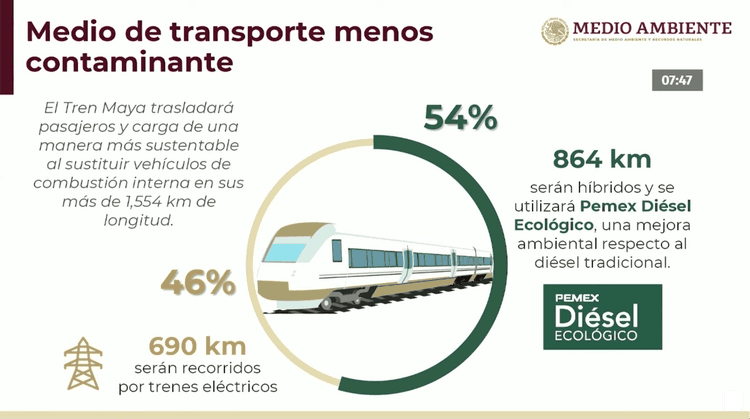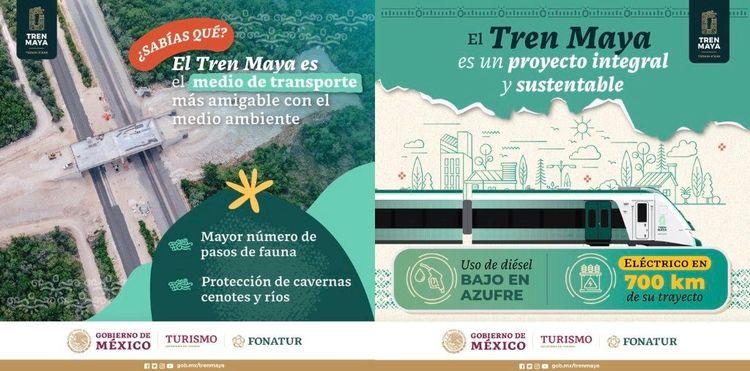The Mayan Train route will use 54% of so-called ecological diesel and 46% of electrical energy to transport people and cargo. This is part of the environmental measures of the megaproject that were announced last June by María Luisa Albores, head of the Secretariat of Environment and Natural Resources (Semarnat).
The main characteristic of so-called ecological diesel is its low sulfur levels, as presented by the federal government.
However, calling an originally fossil fuel “ecological” has been questioned by specialists and environmental defenders, as well as the official discourse that promotes the Mayan Train as a sustainable and environmentally friendly project.

Presentation of “Environmental Advances of the Maya Train” made by Semarnat in June 2023.
A non-polluting diesel?
Diesel is a hydrocarbon that, being derived from petroleum, is referred to as a fossil energy, just like coal and natural gas. Although these types of fuels are formed from the decomposition of organic matter, when they are subjected to burning (combustion) processes, they release gases such as benzopyrene, carbon dioxide (CO2), sulfur dioxide (SO2) and nitrogen oxides.
These gases go into the atmosphere and result in global warming. Other environmental impacts such as air, soil and water pollution, acid rain, increased droughts and floods are also attributed to this. The same ones that have an impact on health.
Faced with the climate crisis and efforts to mitigate it, countries such as Germany, France or the United States have implemented so-called biodiesel, made from vegetable oils and animal fats, which produce less gas emissions during combustion.
However, biodiesel should not be confused with organic diesel, actually called low-sulfur diesel. Because unlike the first one, the second one (which will be used in the Mayan Train) only has the peculiarity of containing a lower sulfur concentration.
“The train will run on a special, non-polluting diesel. That's why I'm talking about good news, because it's a diesel that's going to be imported from the Deer Park refinery (from Pemex), and not only is it going to be used for the train, it's low in sulfur, no polluting, but the decision has already been made that it will be the diesel that will be used throughout the peninsula...”, said President Andrés Manuel López at a morning conference since December of last year.
This type of promotion with respect to the Maya Train has resulted in the project being advertised on its official channels as sustainable and environmentally friendly.
A diesel with an environmental impact
According to experts consulted by Causa Natura Media, low levels of sulfur in organic diesel do not, however, represent a lower environmental impact.
“Lower sulfur dioxide doesn't mean it's not polluting because it still generates carbon dioxide, which is one of the main greenhouse gases, and nitrous oxide, which affects human health and has a much stronger potential to retain heat than carbon dioxide,” explained Viridiana Lázaro, a specialist in agriculture and climate change at Greenpeace Mexico.
Sulfur is a natural component of petroleum. And it is estimated that low-sulfur diesel contains 97% less than the typical diesel, which helps to reduce gas emissions to the atmosphere.
Although in the case of this “ecological diesel”, the presence of other compounds such as nitrous oxide is maintained, from which it has been documented that molecules can remain in the atmosphere for up to 114 years before being eliminated. According to the U.S. Environmental Protection Agency, just one kilogram of this released oxide represents nearly 300 times the warming that produces the same amount of carbon dioxide.
“The most important negative effect is the release of CO2 into the environment and there is no way to remove it. As much as it is extracted more efficiently, the negative effect is there. There's no way to call it green. That's pure greenwashing,” said Luis Zambrano, a researcher at the Institute of Biology of the National Autonomous University of Mexico (UNAM).
The researcher recognizes that changing mobility to trains is an improvement in terms of public policies. However, in cases such as the Mayan Train, these intentions seem mermaid as it is a mega-tourism project that continues to promote the use of roads to travel by car to the destination, as well as air travel to reach Cancun, Quintana Roo.
“Attracting this tourism isn't really reducing ecosystem effects, it's promoting more impacts,” he added.

Official promotion of the Mayan Train as a sustainable project.
A (non) sustainable megaproject
On the long-term impacts of low-sulfur diesel, Greenpeace's Viridiana Lázaro recognizes that there could be some differences.
“The fact that sulfur dioxide is reduced is a help, there is no denying it. But we talk about the Mayan Train from the angle that it hasn't been a good idea in that area because of the ecological impact it has, because of the deforestation that has taken place and because of the fragmentation of an ecosystem and a very important ecological corridor that connects Mexico with Central America”, points out the specialist.
But in order to assess whether or not low-sulfur diesel can be a benefit, specialists agree that the megaproject being discussed must be put into context. In addition to not falling into the narrative about a non-polluting fuel.
“This low-sulfur diesel is not equivalent to all the greenhouse gases that were released as a result of deforestation for construction... So if you put these two aspects in the balance, I can't tell you that using diesel is better than the conventional one because, although it may be, in this context the best thing would be if the Mayan Train had not occurred under those conditions”, concluded Lázaro.
*This content was produced with the support of the Institute for War And Peace Reporting and mentoring from Animal Político, within the framework of the Mexican Journalism Resiliency program.



Comentarios (0)